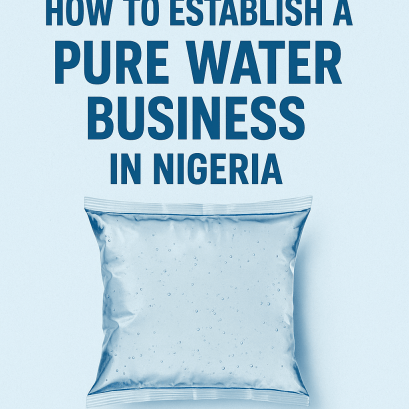
Pure water, often known as sachet water, is an industrial business that you can start in Nigeria to earn a consistent income.
If you want to establish a business that caters to people’s everyday requirements, the Sachet water business is one of the greatest you can start right now, and you don’t need to have all of the money in the world to get started.
Some water selling businesses not only make sachet water, but also bottled water, soft drinks, and juice drinks to increase their income, so if you are interested in starting something like that, you should take your plan, make the right plans, and make available the necessary resources and people to hire as workers to make everything work out for you, and don’t forget to direct your advertisements in the right direction.
Those who do not have access to treated water, as well as those who prioritize their health, seek pure water. The simplicity of distribution through bottles and water jugs has boosted its popularity, making it a perfect market for prospective small company owners. Let’s look at what you’ll need to do to get started in the pure water company.
Develop a business plan
The first step is to put together a comprehensive business plan. Determine your operational scale. Do you wish to operate locally, in a town or city, or on a wider scale? Scale affects equipment size, personnel numbers, and expenses.
As a newcomer to this type of business, begin with local operations and required equipment, and then expand as the market grows. Your business plan should include equipment and staffing expenditures that vary depending on the size of your activities.
Obtain license and compliance certificates
This is another requirement for a successful pure water business in Nigeria. To conduct business lawfully in Nigeria, you must obtain the relevant licenses from local governments, health permits from the health department, and tax compliance certifications from the IRS. Prioritize health permits because the product is consumable. Opening a business bank account for your water business is also required.
Secure startup finance
Determine the necessary funding for overheads, initial inventory, office equipment, employee training, insurance, and other expenses. Consider factoring, bank loans, tapping into savings, or approaching investors to support your firm.
Choose a central production location
Choose a convenient location for your operations to reduce transportation expenditures. Distribution costs may exceed packaging costs, stressing the necessity for centralization.
Hire and train personnel
Employ a diverse spectrum of employees, including equipment operators, delivery drivers, office personnel, and marketers. The correct team is critical for effective operations. The better team you can put together will enhance business production and, most likely, sales because they will be looking for new clients rather than you.
Develop a marketing strategy
This is also critical; without the proper marketing strategy, a firm will most likely fail, and you must research the pure water market to uncover untapped niches. Developing an effective marketing plan is critical to success. Branding, health advantages, price, and personal customer contacts can all help you differentiate your product.
Implement an advertising plan
Create interesting promotional messages that highlight the health benefits of your water. Gradually invest in marketing channels that produce the highest conversions. You can even offer little incentives to new consumers, encouraging them to choose you over a competition in the same area. You win more than others when you take your advertising seriously and outperform your competitors.
Create relationships to expand distribution
Participate in health fairs and develop collaborations with businesses, schools, hospitals, and retail stores. Prioritize larger-volume water sales for offices and schools, but preserve smaller bottles for restaurants and shops.
Steps to Set Up a Pure Water Business in Nigeria
1. Write Your Business Plan:
A detailed plan is essential for fundraising, operations, marketing, and management. A business plan is a blueprint for success.
2. Buy or rent land:
Purchase land for your factory. A single piece of land is often adequate for small-scale businesses. Prices vary by location.
3. Construct the Bungalow:
Build a manufacturing structure, including finishing, furnishing, and borehole installation. Budget between N15 million and N20 million.
4. Set up a distillation system:
Select a water purification method, such as distillation or UV filtering. Costs range between N2 million and N5 million.
5. Purchase Automatic Sealing Machines:
Purchase sealing equipment for packaging for between N400,000 and N3,000,000.
6. Purchase a Supply Truck:
Invest in a dependable supply truck to ensure effective distribution. A used European truck costs approximately N5 million.
7. Employ factory workers:
Form a diversified workforce that includes operators, packagers, cleaners, drivers, marketers, security guards, and managers.
8. Obtain NAFDAC approval:
Get NAFDAC approval for your production. The process may take several months and entails adhering to strict regulations.

Leave a Reply